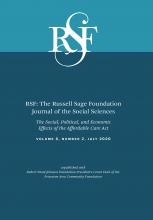Research Article
Open Access
The Affordable Care Act and the Diffusion of Policy Feedback: The Case of Medicaid Work Requirements
Richard C. Fording, Dana Patton
RSF: The Russell Sage Foundation Journal of the Social Sciences July 2020, 6 (2) 131-153; DOI: https://doi.org/10.7758/RSF.2020.6.2.06
Richard C. Fording
aMarilyn Williams Elmore and John Durr Elmore Endowed Professor at the University of Alabama
Dana Patton
bassociate professor and director of the MPA Program in the Department of Political Science at the University of Alabama

REFERENCES
- ↵
- Achen, Christopher, and
- Larry Bartels
- ↵
- Ansolabehere, Stephen
- ↵
- Ansolabehere, Stephen, and
- Brian F. Schaffner
- ↵
- ↵
- Béland, Daniel
- ↵
- Béland, Daniel,
- Philip Rocco, and
- Alex Waddan
- ↵
- Bernick, Ethan M., and
- Nathan Myers
- ↵
- Berry, Frances Stokes, and
- William D. Berry
- ↵
- Boehmke, Frederick J., and
- Richard Witmer
- ↵
- Callaghan, Timothy, and
- Lawrence R. Jacobs
- ↵
- Campbell, Andrea Louise
- ↵
- Campbell, Andrea Louise
- ↵
- Chattopadhyay, Jacqueline
- ↵
- Clark, Jill
- ↵
- Clinton, Joshua D., and
- Michael W. Sances
- ↵
- Cohen, Jeffrey E., and
- James D. King
- ↵
- ↵
- Durr, Robert H.,
- John B. Gilmour, and
- Christina Wolbrecht
- ↵
- Fenno, Richard F
- ↵
- ↵
- ↵
- Glick, Henry R., and
- Scott P. Hays
- ↵
- Gore, Leada
- ↵
- ↵
- Gray, Virginia
- ↵
- Grogan, Colleen M., and
- Sunggeun Ethan Park
- ↵
- Grogan, Colleen M
- ↵
- Grogan, Colleen N.,
- Phillip M. Singer, and
- David K. Jones
- ↵
- Hacker, Jacob S., and
- Paul Pierson
- ↵
- Haselswerdt, Jake
- ↵
- Holyoke, Thomas T.,
- Jeffrey R. Henig,
- Heath Brown, and
- Natalie Lacireno-Paquet
- ↵
- Hopkins, Daniel J., and
- Kalind Parish
- ↵
- Jacobs, Lawrence R., and
- Timothy Callaghan
- ↵
- Kaiser Family Foundation
- ↵
- Kaiser Family Foundation
- ↵
- Kaiser Family Foundation
- ↵
- Karch, Andrew
- ↵
- ↵
- Kingdon, John W
- ↵
- Kousser, Thad, and
- Justin H. Phillips
- ↵
- Ku, Leighton.,
- Erin Brantley,
- Erika Steinmetz,
- Brian Bruen, and
- Drisht Pillai
- ↵
- ↵
- Lerman, Amy E., and
- Katherine T. McCabe
- ↵
- Lukens, Gideon
- ↵
- Mayer, Martin,
- Robert Kenter, and
- John C. Morris
- ↵
- McCarthy, Justin
- ↵
- Mettler, Suzanne
- ↵
- Oberlander, Jonathan, and
- R. Kent Weaver
- ↵
- ↵
- Patashnik, Eric M., and
- Julian E. Zelizer
- ↵
- Pew Research Center
- ↵
- Pierson, Paul
- ↵
- Plein, Christopher L
- ↵
- Quinn, Mattie
- ↵
- Rogers, Everett M
- ↵
- Schwartz, David
- ↵
- ↵
- Shipan, Charles R., and
- Craig Volden
- ↵
- Skocpol, Theda
- ↵
- Soss, Joe,
- Richard C. Fording, and
- Sanford F. Schram
- ↵
- Taber, Charles S., and
- Milton Lodge
- ↵
- ↵
- Walker, Jack L
- ↵
- Wheaton, Sara
In this issue
The Affordable Care Act and the Diffusion of Policy Feedback: The Case of Medicaid Work Requirements
Richard C. Fording, Dana Patton
RSF: The Russell Sage Foundation Journal of the Social Sciences Jul 2020, 6 (2) 131-153; DOI: 10.7758/RSF.2020.6.2.06
Jump to section
- Article
- Abstract
- THE COMPLEXITY OF POLICY FEEDBACK EFFECTS
- POLICY FEEDBACK IN A DECENTRALIZED POLICY ENVIRONMENT
- THE DIFFUSION OF POLICY FEEDBACK IN A FEDERAL SYSTEM: AN ANALYTICAL FRAMEWORK
- APPLYING THE FRAMEWORK TO MEDICAID EXPANSION
- THE INITIAL ADOPTION OF MEDICAID EXPANSION
- POLICY FEEDBACK EFFECTS AND THE DIFFUSION OF POLICY MODIFICATION
- MEDICAID EXPANSION AND EVALUATIVE FEEDBACK: AN EMPIRICAL ANALYSIS
- EVALUATIVE FEEDBACK EFFECTS AND MEDICAID WORK REQUIREMENTS
- CONCLUSION
- FOOTNOTES
- REFERENCES
- Figures & Data
- Additional
- Info & Metrics
- References





